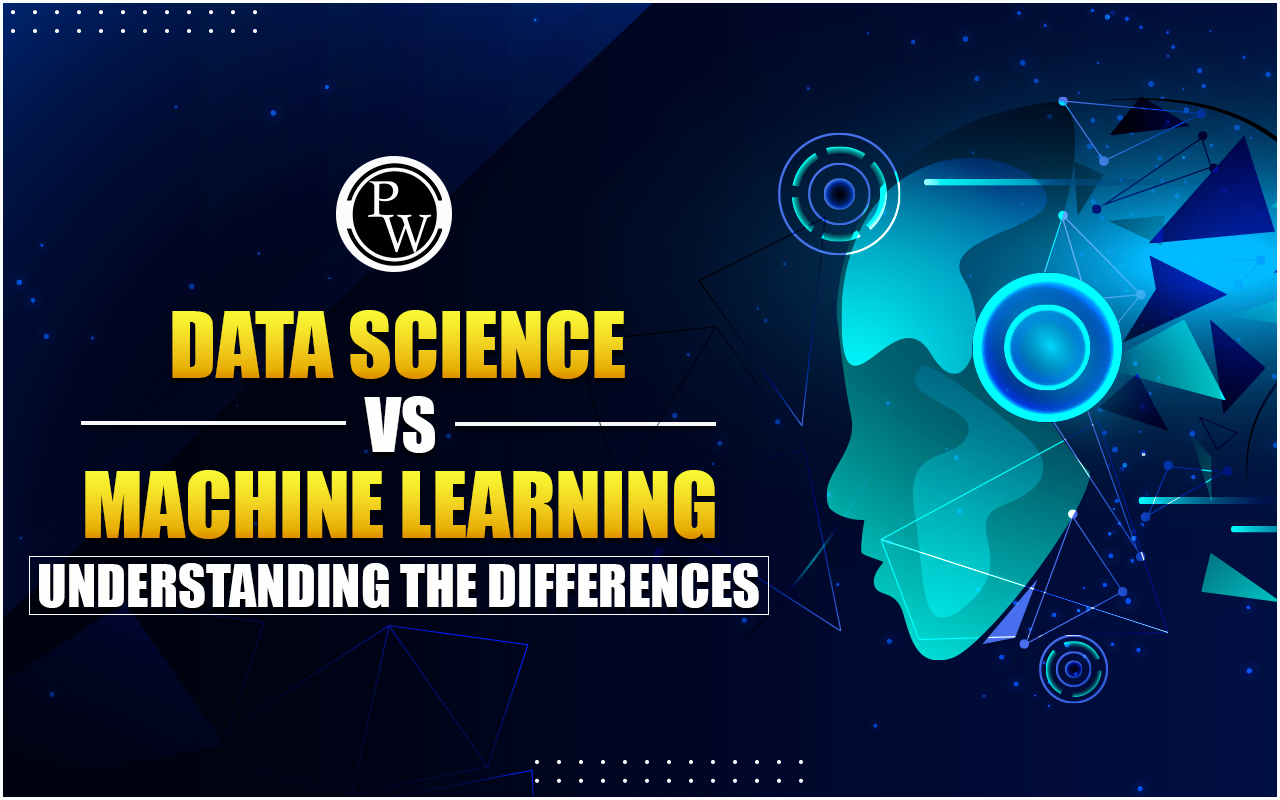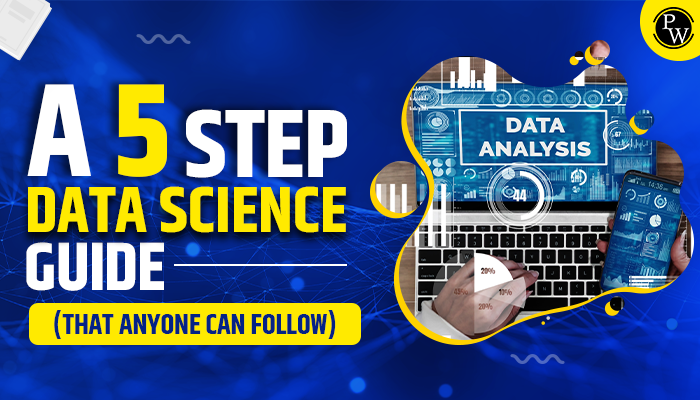Data Science vs. Machine Learning: In the dynamic landscape of today’s technology-driven world, the fields of Data Science and Machine Learning have emerged as pivotal players, revolutionising the way we interpret and utilise data. As businesses increasingly rely on data-driven insights, the distinctions between these two domains become crucial for aspiring professionals and industry enthusiasts.
If you’re looking to build a successful career in Data Science, a Full-Stack Data Science course could really help you! In this blog, we’ll talk about data science vs. machine learning and which of these 2 fields is better.
What Is Data Science?

In the expansive realm of Data Science, experts blend statistical techniques, programming, and domain knowledge to draw valuable insights from large datasets. This interdisciplinary method enables a profound grasp of intricate data, aiding well-informed decision-making in organisations. Data Scientists utilise diverse strategies like data cleaning, exploratory data analysis, and machine learning to unveil concealed patterns and trends.
Skills Needed in Data Science
- Analytical Proficiency: Data Scientists demand sharp analytical skills to decode intricate datasets. This entails recognizing trends, patterns, and correlations that guide strategic decision-making.
- Programming Mastery: A vital aspect involves adeptness in programming languages like Python, R, or SQL. These languages serve for data manipulation, analysis, and the execution of machine learning algorithms.
- Statistical Expertise: A robust base in statistics is crucial for deriving meaningful insights from data. Grasping probability, hypothesis testing, and regression analysis stands as pivotal components in statistical expertise.
- Data Wrangling and Cleaning: Dealing with real-world data often involves cleaning and preprocessing. Data Scientists should be adept at handling missing values, outliers, and ensuring data quality.
- Machine Learning Basics: While not exclusively machine learning professionals, Data Scientists should have a fundamental understanding of machine learning concepts to apply appropriate models to their analyses.
- Data Visualization Skills: Communicating findings effectively is vital. Data Scientists use visualisation tools to present their insights in a clear and compelling manner.
Job Roles in Data Science
- Data Scientist: Analysing intricate data to guide business decisions, they blend statistical analysis, machine learning, and domain expertise.
- Data Analyst: Concentrating on refining and handling data, they extract meaningful insights, facilitating decision-making.
- Data Engineer: Tasked with building and sustaining the necessary systems and architecture for data generation, processing, and analysis.
- Business Intelligence Analyst: Professionals in this role utilise data to provide insights into business strategies, helping organisations make informed and strategic decisions.
Also Read: Skills Required to Become Data Scientist in 2023
What Is Machine Learning?
Machine Learning is a part of artificial intelligence. It concentrates on creating algorithms and statistical models for computers to complete tasks without explicit programming. Instead, machines learn from data, enhancing their performance over time. This field is at the forefront of technological advancements, with applications ranging from image recognition and natural language processing to predictive analytics.
Skills Needed in Machine Learning
- Strong Programming Skills: A robust grasp of programming is crucial. Proficiency in languages like Python or Java is necessary for implementing and deploying machine learning algorithms.
- Understanding of Algorithms: Comprehending algorithms is key. Machine Learning experts must deeply understand various algorithms and their suitability for different data and tasks.
- Data Modeling and Evaluation: Crafting effective models and evaluating their performance is a critical skill. This involves selecting appropriate algorithms and fine-tuning model parameters.
- Knowledge of Frameworks: Familiarity with machine learning frameworks like TensorFlow, PyTorch, or scikit-learn is essential for efficiently implementing and deploying machine learning models.
- Domain Expertise: Understanding the domain in which machine learning is applied enhances the effectiveness of solutions. Domain expertise aids in selecting relevant features and interpreting model outputs.
Job Roles in Machine Learning
- Machine Learning Engineer: Responsible for designing and deploying scalable machine learning systems, Machine Learning Engineers focus on turning models into practical applications.
- Data Scientist (ML Focus): Data Scientists with a concentration in machine learning specialise in using data to train models and make predictions, bridging the gap between data analysis and machine learning.
- Research Scientist (ML): Involved in pushing the boundaries of machine learning, Research Scientists explore and advance the theoretical foundations of the field.
- AI Engineer: These professionals work on developing artificial intelligence solutions, which often involve the integration of machine learning principles.
Data Science vs. Machine Learning: What’s the Difference?
As we explore Data Science and Machine Learning further, it’s vital to discern the nuances distinguishing these fields. While they often overlap, each has a unique focus and purpose in the broader realm of data-driven decision-making.
1. Scope and Objectives
Data Science:
Data Science, in its expansive scope, encompasses a wide range of activities aimed at extracting actionable insights from raw data. It involves data collection, cleaning, analysis, and interpretation. The primary objective is to unearth patterns, trends, and correlations that can guide strategic decision-making within an organisation. Data Scientists employ statistical techniques, machine learning algorithms, and domain expertise to derive meaning from diverse datasets.
Machine Learning:
On the other hand, Machine Learning is a subset of Data Science with a more focused objective. It revolves around the development of algorithms that enable machines to learn from data and make predictions or decisions without explicit programming. While Data Science involves a holistic approach to data analysis, Machine Learning specifically deals with the training and deployment of predictive models.
2. Nature of Activities
Data Science:
The activities within Data Science cover a broad spectrum, from data collection and cleaning to exploratory data analysis and the development of predictive models. Data Scientists often engage in data visualisation to communicate their findings effectively. Their role extends to understanding business problems, formulating hypotheses, and validating them through data analysis.
Machine Learning:
Machine Learning is more focused on the development and deployment of models. This includes selecting appropriate algorithms, training models on historical data, fine-tuning parameters, and evaluating their performance. Machine Learning practitioners are concerned with predictive analytics, classification, regression, and clustering tasks, where the emphasis lies on automating decision-making processes.
3. Time Horizon
Data Science:
Data Science projects may span various time horizons. They could involve short-term analyses to address immediate business questions or long-term projects aimed at establishing robust data-driven strategies. The time frame for Data Science projects depends on the complexity of the questions being addressed and the depth of insights sought.
Machine Learning:
Machine Learning projects often have a more extended focus on the model development life cycle. This involves not only building and training models but also continuous monitoring, evaluation, and adaptation to ensure optimal performance over time. The iterative nature of Machine Learning projects sets them on a longer time horizon compared to some Data Science initiatives.
4. Outcome and Deliverables
Data Science:
The primary deliverables of Data Science include comprehensive reports, data visualisations, and insights that inform decision-makers. Data Scientists often contribute to the strategic vision of a business by providing a deeper understanding of market trends, customer behaviours, and operational efficiencies.
Machine Learning:
Machine Learning projects, on the other hand, culminate in the deployment of models for real-time decision-making. The outcomes are often automated systems capable of making predictions or classifications without human intervention. The deliverables in Machine Learning are the models themselves, integrated into production systems to enhance operational efficiency.
5. Interdisciplinary Nature
Data Science:
Data Science combines various fields like statistics, computer science, and domain-specific knowledge. A Data Scientist must master a range of skills to address the diverse challenges of data analysis.
Machine Learning:
While Machine Learning also requires interdisciplinary skills, its primary focus is on algorithm development and model deployment. Machine Learning Engineers, for instance, need a deep understanding of algorithms, programming, and data, but their expertise may not extend as broadly as that of a Data Scientist.
Also Check: Data Mining Vs Machine Learning – PW Skills
Data Science vs Machine Learning: Which is Better?
As the realms of Data Science and Machine Learning continue to gain prominence in the tech landscape, individuals contemplating a career in these fields often find themselves pondering a fundamental question: which path is better suited for them? While the answer lies in personal preferences, career goals, and individual strengths, a closer examination of the characteristics and nuances of each field can help shed light on the decision-making process.
Understanding the Landscape
Data Science – The Versatile Foundation
Data Science, with its interdisciplinary nature, serves as a versatile foundation. It is akin to a toolbox equipped with various techniques and methodologies for extracting insights from data. If you enjoy the entire data lifecycle – from data cleaning and exploration to advanced analytics and visualisation – Data Science may be the optimal choice. The role of a Data Scientist, in particular, involves a holistic approach to data, requiring a blend of statistical, programming, and business acumen.
Machine Learning – Specialized Predictive Power
In contrast, Machine Learning is a specialised aspect of Data Science. It centres on creating algorithms that empower machines to learn and predict. If you’re keen on unravelling algorithm intricacies, training models, and engaging in predictive analytics, a career in Machine Learning may be fitting. Machine Learning Engineers, especially, are pivotal in designing and implementing systems for continuous performance enhancement.
Assessing Personal Interests
Data Science – The Curious Explorer
If you find joy in exploring diverse datasets, uncovering hidden patterns, and deriving meaningful insights that can influence strategic decisions, Data Science may be your calling. Data Scientists often act as data detectives, using their analytical skills to solve complex problems and communicate their findings effectively.
Machine Learning – The Algorithmic Innovator
For those captivated by algorithms, creating models that learn from data and predict is the heart of Machine Learning. If you’re motivated by pushing technological limits, a career in Machine Learning could be the ideal platform for your innovative drive.
Career Growth and Opportunities
Data Science – A Broad Spectrum
Data Science, with its broad spectrum, opens doors to various job roles across industries. From traditional sectors like finance and healthcare to emerging domains like e-commerce and cybersecurity, Data Scientists are in demand to make sense of the ever-increasing volumes of data. The versatility of Data Science skills often translates into a broader range of career opportunities.
Machine Learning – Specialised Expertise
Machine Learning, with its specialised focus on algorithms and predictive modelling, offers opportunities to work on cutting-edge technologies. As industries increasingly integrate AI solutions, the demand for Machine Learning Engineers and specialists continues to grow. The specialised expertise gained in Machine Learning can lead to impactful roles in fields like autonomous vehicles, natural language processing, and computer vision.
Also Read: Best Data Science Courses In India With Placements
Machine Learning vs Data Science: Which is Easy?
Understanding the Foundations
Data Science Foundations
Data Science, as a multifaceted discipline, lays its foundation on a diverse set of skills. The journey begins with a solid understanding of statistics and mathematics. Data cleaning and wrangling, often the initial steps in a Data Science project, require proficiency in programming languages such as Python or R. Visualization tools, like Tableau or Matplotlib, come into play to communicate findings effectively. The challenge lies in the breadth of knowledge required, as a Data Scientist must be adept at various stages of the data analysis pipeline.
Machine Learning Foundations
On the other hand, Machine Learning has a more specialised focus. While a solid understanding of mathematics and programming is crucial here as well, the emphasis shifts towards algorithms, model development, and optimization.
Delving into Machine Learning necessitates a grasp of concepts like supervised and unsupervised learning, regression, classification, and clustering. The challenge in Machine Learning often revolves around selecting the right algorithm for a given problem and fine-tuning its parameters.
Ease Depends on Background and Interests
Data Science:
If you have a strong background in statistics, mathematics, or programming, Data Science might seem like a more accessible entry point. Professionals from diverse domains can transition into Data Science, bringing their expertise to the field. The wide array of tools and techniques in Data Science allows individuals to find their niche, whether it be in data visualisation, statistical modelling, or machine learning.
Machine Learning:
For those fascinated by algorithms, pattern recognition, and predictive modelling, Machine Learning can be an exciting journey. A solid foundation in mathematics and programming, especially in languages like Python, can make the learning curve smoother. However, the specialised nature of Machine Learning might be challenging for those without a strong quantitative background.
The Role of Interest and Application
The perceived difficulty of learning Data Science or Machine Learning is also deeply tied to individual interest and the intended application of the acquired skills. If you are passionate about unravelling insights from data and enjoy the storytelling aspect of conveying those insights, Data Science might align better with your interests. On the other hand, if you find joy in building and fine-tuning models, predicting outcomes, and pushing the boundaries of what machines can learn, Machine Learning might be your calling.
Data Science vs Machine Learning Salary in India
In the Indian job market, the demand for skilled professionals in both Data Science and Machine Learning has surged in recent years, leading to competitive remuneration packages. However, there are subtle distinctions in the salary structures of these fields.
Data Science professionals in India often enjoy lucrative salaries, commensurate with their expertise and experience. According to industry reports, entry-level Data Scientists can expect a salary ranging from INR 6 to 10 lakhs per annum. As one ascends the career ladder, with years of experience and specialised skills, the compensation can surpass INR 20 lakhs per annum or more, particularly in top-tier organisations.
On the other hand, Machine Learning professionals tend to command slightly higher salaries, given the specialised nature of their roles. Entry-level Machine Learning Engineers may start with a salary ranging between INR 8 to 12 lakhs per annum, and experienced professionals can see their compensation reach INR 25 lakhs per annum or higher, especially in industries like finance, healthcare, and e-commerce that heavily leverage machine learning applications.
Machine Learning or Data Science: Which Has a Better Future?
As technology continues to advance at an unprecedented rate, both Machine Learning (ML) and Data Science (DS) stand at the forefront of innovation. The question of which field holds a better future is complex, as it depends on various factors, including industry trends, individual preferences, and the evolving needs of the job market.
Data Science
Data Science, with its broad and interdisciplinary nature, is witnessing a surge in demand across diverse industries. The ability to extract valuable insights from data has become a cornerstone for decision-making in businesses ranging from finance and healthcare to e-commerce and beyond. As companies accumulate vast amounts of data, the role of Data Scientists becomes increasingly crucial. One notable aspect contributing to the promising future of Data Science is its versatility. Data Scientists often find themselves collaborating with professionals from different domains, utilising their analytical skills to solve complex problems. The demand for professionals who can bridge the gap between raw data and actionable insights is unlikely to wane, making Data Science a resilient and sought-after field.
Machine Learning
Machine Learning, on the other hand, is driving innovation by enabling computers to learn and adapt without explicit programming. This field has seen remarkable growth, particularly with the rise of artificial intelligence (AI) applications. From recommendation systems to image recognition and natural language processing, ML is at the core of many cutting-edge technologies.
The future of Machine Learning is closely tied to the advancement of AI. As AI continues to permeate various industries, the demand for professionals who can develop and implement machine learning models will persist. Machine Learning Engineers and AI Engineers are likely to be in high demand as businesses seek to leverage the power of AI for automation, optimization, and intelligent decision-making.
Also Read: Types Of Regression Analysis In Machine Learning
Choosing the Right Path
Ultimately, the decision between pursuing a career in Data Science or Machine Learning should align with individual interests, strengths, and career goals. While both fields offer promising futures, the nature of the work and the specific skill sets required differ significantly. For those inclined towards a holistic approach, where data interpretation and decision-making take centre stage, Data Science may be the preferred choice. If, however, the allure of developing algorithms, training models, and pushing the boundaries of AI is captivating, Machine Learning could be the ideal path.
Conclusion
Whether you choose Data Science or Machine Learning depends on your interests, skills, and career goals. If you enjoy a broad spectrum of tasks and want to contribute to decision-making processes, Data Science may be the right fit. On the other hand, if you’re passionate about creating intelligent systems, predicting outcomes, and working on cutting-edge algorithms, Machine Learning might be your calling. Ultimately, both fields offer exciting career paths with ample opportunities for growth. As you embark on your journey in Data Science or Machine Learning, stay curious, continuously update your skills, and be ready to adapt to the ever-evolving landscape of technology.
The PW Skills Full Stack Data Science Pro course is the perfect way to boost your skills and advance your career. With our comprehensive curriculum and experienced instructors, you’ll be prepared for any data science challenge. Enroll Today and Start Your Journey to a Rewarding Career!
FAQs
Is expertise in mathematics mandatory for a career in Data Science or Machine Learning?
While a strong foundation in mathematics is beneficial, it's not necessarily mandatory. Many entry-level roles in Data Science and Machine Learning focus on practical applications and may require more emphasis on programming, data analysis, and domain-specific knowledge.
Can one transition from a non-technical background to a career in Data Science or Machine Learning?
Yes, transitioning from a non-technical background is possible. Many resources, including online courses and bootcamps, cater specifically to individuals looking to enter the fields of Data Science and Machine Learning. Focus on building a strong foundation in programming, statistics, and relevant tools, and consider practical projects to showcase your skills to potential employers.
Are there differences in the application of Data Science and Machine Learning across various industries?
Absolutely. While the core principles remain the same, the application of Data Science and Machine Learning varies across industries. For example, in healthcare, these fields might be used for predictive analytics and personalised medicine, while in finance, they could be applied for fraud detection and risk assessment.
How important is domain expertise in Data Science and Machine Learning roles?
Domain expertise adds significant value in both Data Science and Machine Learning. Understanding the nuances of the industry you're working in enhances the quality of analysis and model development..
What role does ethical consideration play in Data Science and Machine Learning?
Ethical considerations are paramount in both fields. As these technologies influence decision-making processes, it's crucial to address potential biases in data, algorithms, and outcomes.




